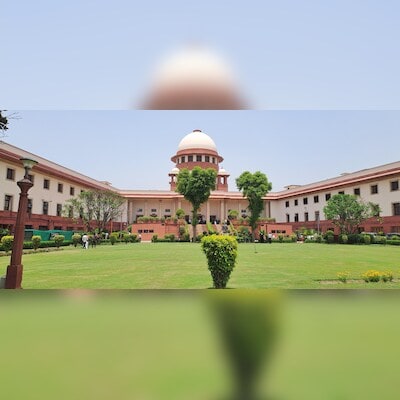Excessive bail is no bail, the Supreme Court said Thursday, noting that granting bail and then imposing onerous conditions is taking away with the left hand what is given with the right.
The Supreme Court said an order protecting the fundamental right of the individual under Article 21 of the Constitution while ensuring his presence would be reasonable and proportionate.
A bench comprising Justices BR Gavai and KV Viswanathan delivered its verdict on a petition filed by a man against whom 13 FIRs have been lodged in various states for various offences, including fraud.
The petitioner had submitted before the Supreme Court that he had been granted bail in these 13 cases and had complied with the bail conditions in two of them.
The high court noted that the petitioner’s main contention was that he was not in a position to furnish separate sureties as stated in the remaining 11 bail orders.
“The situation today is that despite having been granted bail in 13 cases, the petitioner has not been able to furnish any guarantees,” the court said.
“From time immemorial, the principle has been that excessive bail is no bail. Granting bail and then imposing excessive and onerous conditions is taking away with the left hand what is given with the right,” he said, adding that what is excessive will depend on the facts and circumstances of each case.
Referring to the case, the court said the petitioner was experiencing “genuine difficulty” in finding multiple guarantors.
He noted that sureties were essential to ensure the presence of the accused on bail.
“At the same time, when the court is faced with the situation where the accused posted on bail is unable to find sureties, as ordered, in multiple cases, there is also a need to balance the requirement of providing sureties with their fundamental rights under Article 21 of the Constitution of India,” he said.
The court, referring to the definition of “guarantor”, noted that whether it was to secure persons to act as guarantors for a loan transaction or as sureties in a criminal proceeding, a person’s choice was very limited.
He said the guarantor would very often be a close relative or an old friend and in a criminal case, the circle can be reduced even further as the normal tendency was not to reveal information about such proceedings to relatives and friends, in order to protect one’s reputation.
“The realities of life in our country are harsh and, as a court of law, we cannot turn a blind eye to them. However, a solution must be found strictly within the framework of the law,” he said.
The court noted that in one of the bail orders in an FIR registered in Rajasthan, there was an order to provide a local surety.
He said the petitioner is a native of Haryana and getting a local guarantee will be an arduous task for him.
“Keeping in view the principles discussed above, we order that for the FIRs pending in each of the States of Uttar Pradesh, Rajasthan, Punjab and Uttarakhand, in each State, the petitioner shall furnish his personal bond of Rs 50,000 and provide two sureties who will execute the bond of Rs 30,000 each, which shall be valid for all the FIRs in the State concerned…” the court said.
“The same set of guarantors is allowed to act as collateral in all states,” he said.
(Only the headline and image of this report may have been reworked by Business Standard staff; the rest of the content is auto-generated from a syndicated feed.)
First published: August 23, 2024 | 00:09 IS
Disclaimer:
The information contained in this post is for general information purposes only. We make no representations or warranties of any kind, express or implied, about the completeness, accuracy, reliability, suitability or availability with respect to the website or the information, products, services, or related graphics contained on the post for any purpose.
We respect the intellectual property rights of content creators. If you are the owner of any material featured on our website and have concerns about its use, please contact us. We are committed to addressing any copyright issues promptly and will remove any material within 2 days of receiving a request from the rightful owner.

